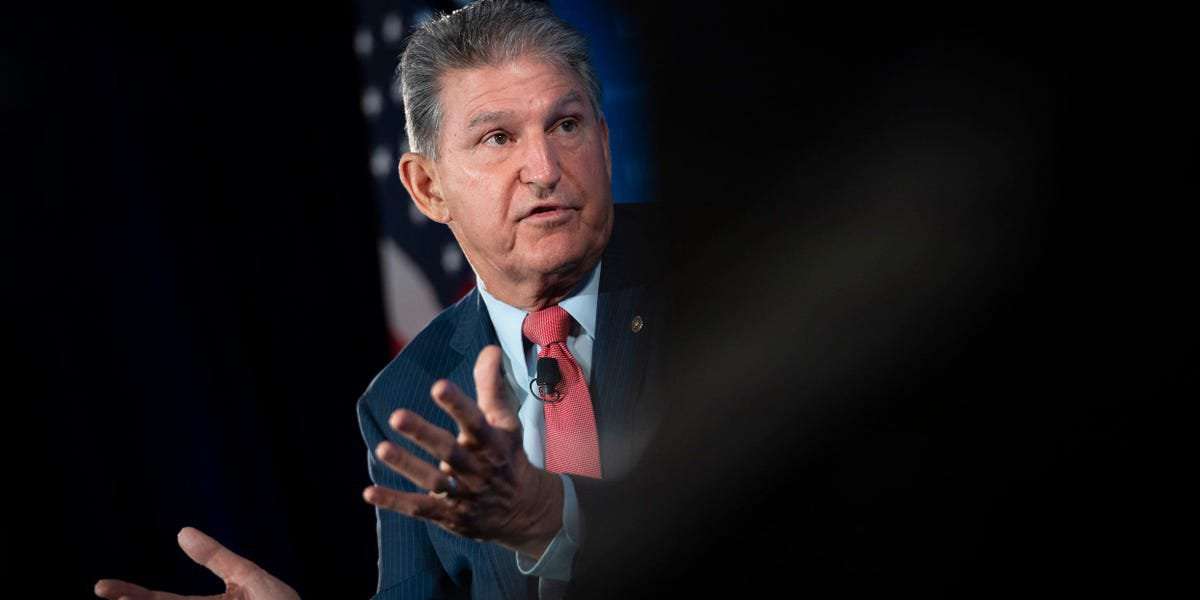Sen. Joe Manchin poured cold water on a possible billionaire's tax on Wednesday.
"I don't like it," Manchin said, adding that the ultrawealthy have "created a lot of jobs."
"I don't like the connotation that we're targeting different people," he said.
Get a daily selection of our top stories based on your reading preferences. Loading Something is loading. Email address By clicking ‘Sign up’, you agree to receive marketing emails from Insider as well as other partner offers and accept our Terms of Service and Privacy Policy
When asked on Wednesday if he would support a possible billionaire's tax, Democratic Sen. Joe Manchin of West Virginia poured cold water on the notion, but didn't outright promise to oppose it.
"I'm supporting basically that everyone should pay their fair share," Manchin said. "And I've just tried to think of it — I don't like the connotation that we're targeting different people."
A potential billionaire's tax has emerged in recent days as a way to break the logjam in Congress on President Joe Biden's infrastructure package. Sen. Kyrsten Sinema of Arizona, the other prominent centrist Democrat alongside Manchin who has opposed many of the ways to pay for Bidens agenda, is reportedly more open to taxing billionaires than raising the corporate tax rate, although on Tuesday she lent her support to a 15% minimum tax on the largest corporations.
In a gaggle with reporters on Wednesday, Manchin said "there should be a 15% patriotic tax — that's me speaking," referring to the proposal Sinema also supports, which was produced by Sens. Ron Wyden, Angus King, and Elizabeth Warren. Wyden is also drafting the so-called billionaire's tax.
At the same time, Manchin explained his hesitation on specifically taxing billionaires.
"There's people that basically, they've contributed to society, they've created a lot of jobs and invested a lot of money and give a lot to philanthropic pursuits, but it's time that we all pull together and grow together," he continued.
"Everyone's going to pay. I believe we will end up where everyone must participate," Manchin later added, leaving himself some wiggle room.
Senate Democrats are treading carefully around the Wyden proposal. "I'm not opposed to billionaires paying their fair share in taxes," Sen. Dick Durbin, the number two Senate Democrat, told Insider. "I'd like to know the details."
Sen. Mark Warner of Virginia told reporters it may "distort markets" depending on how tradable assets like stocks are taxed.
"It's riskier," Sen. Tim Kaine of Virginia told Insider. "I think conceptually, it makes perfect sense ... We just need to make sure we get the details right."
Democrats are focusing on the richest Americans, rather than just high earners
The latest Democratic proposal targets the 700 or so billionaires in the country, rather than higher-earning Americans more broadly. As Insider's Joseph Zeballos-Roig reported, the proposed hikes would only hit those who make over $100 million a year — or have held $1 billion worth of assets for three years.
The proposal specifically hits what's called unrealized gains. That's the value that unsold assets like stock accrue — something that billionaires generally have a lot of. While the stocks go up in value, that increase isn't taxed unless they opt to sell the asset (this is called a capital gain). Democrats want to change that, and tax against the increased value of the assets. Tesla CEO Elon Musk alone could owe up to $50 billion in a five-year period under the proposal, according to an analysis by economist Gabriel Zucman.
Originally, Democrats had aimed to raise taxes on higher-earning Americans and corporations. However, after resistance from key centrist Sinema, they're looking toward billionaires instead. The measure still isn't quite an outright wealth tax — which is consistently popular with the public — but it does redefine and target a key source of income for America's wealthiest.
It would also impact a smaller and much more focused pool of taxpayers. As Manchin noted, he doesn't like "the connotation that we're targeting different people," and that may complicate negotiations moving forward. However, a billionaire's tax wouldn't impact his constituents too heavily: In 2021, Forbes didn't find any billionaires in West Virginia

Scubalefty on October 27th, 2021 at 16:05 UTC »
Wealth of Mark Zuckerberg:
2009: $2,000,000,000
2021: $117,600,000,000
Wealth of Jeff Bezos:
2009: $6,800,000,000
2021: $192,200,000,000
Wealth of Bill Gates:
2009: $40,000,000,000
2021: $132,400,000,000
Minimum wage:
2009: $7.25
2021: $7.25
We should tax and tax and tax and tax them until they're only fabulously wealthy.
Phy44 on October 27th, 2021 at 15:57 UTC »
Taxes are currently set up to "target different people". The blatant hypocrisy is so tiring.
Oleg101 on October 27th, 2021 at 15:55 UTC »
This guy is truly just awful.
https://twitter.com/mkraju/status/1453378390141161483?s=21